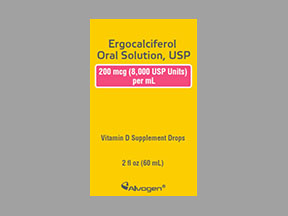
My prescription
Edit
60ML of 200MCG/ML, Ergocalciferol (1 Bottle)
Select pharmacy

Albertsons
$25.53
COUPON PRICE
Walgreens
$35.55
COUPON PRICEErgocalciferol savings card
Show this card to your pharmacist
Albertsons
$25.53
BIN
ID
PCN
GRP
019876
LH3923CA37
CHIPPO
LHX
Powered by
More prescriptions for vitamin D deficiency
More prescriptions for vitamin D deficiency
Price history for Calcidol (brand) & Ergocalciferol (generic)
1 Bottle, 60ML of 200MCG/ML
Average retail price for Calcidol
Average retail price for Ergocalciferol
Average SaveHealth price for Ergocalciferol
Our price history data is based on aggregated prescription data collected from participating pharmacies in America. Our prescription data updates daily to reflect the latest price changes. If you notice a missing data point, it means there wasn't sufficient data available to generate a monetary value for that date.
We analyzed Ergocalciferol prices for (60ML of 200MCG/ML, 1 Bottle) over the last 12 months. The average retail price was $222.98, while the average price using the SaveHealth discount card was $48.20. That's a savings of approximately 78.38% when using our Ergocalciferol coupon.
Compared to the generic version, Calcidol had an average price of $73.99 over the same time period. With the SaveHealth savings card, Ergocalciferol is 34.86% cheaper on average than Calcidol.
*Retail prices are based on pharmacy claims data, and may not be accurate when we don't have enough claims.
Ergocalciferol dosage forms
Dosage Quantity Price from Per unit 1GM 1 Bottle $196.59 $196.59 1GM 2 Bottles $412.16 $206.08 1GM 3 Bottles $627.74 $209.25 60ML of 200MCG/ML 1 Bottle $25.53 $25.53 60ML of 200MCG/ML 2 Bottles $43.56 $21.78 60ML of 200MCG/ML 3 Bottles $61.60 $20.53
| Dosage | Quantity | Price from | Per unit |
|---|---|---|---|
| 1GM | 1 Bottle | $196.59 | $196.59 |
| 1GM | 2 Bottles | $412.16 | $206.08 |
| 1GM | 3 Bottles | $627.74 | $209.25 |
| 60ML of 200MCG/ML | 1 Bottle | $25.53 | $25.53 |
| 60ML of 200MCG/ML | 2 Bottles | $43.56 | $21.78 |
| 60ML of 200MCG/ML | 3 Bottles | $61.60 | $20.53 |
Ergocalciferol Warnings
The safety and warning information for Vitamin D2 (ergocalciferol) is crucial for ensuring its safe and effective use. Below are key points to consider:
High Calcium or Vitamin D Levels: Avoid using Vitamin D2 if you have elevated levels of calcium or vitamin D in your blood. Excessive use can lead to calcium accumulation, which poses a risk to kidney health. This situation is particularly relevant for those treating rickets, as higher doses are typically required. Ensure all scheduled blood tests are completed to monitor vitamin D levels and dosage accuracy. Be alert for symptoms such as persistent nausea, loss of appetite, weight loss, constipation, muscle pain or stiffness, and changes in urination patterns. These may indicate excessive vitamin D intake and elevated calcium levels.
Contraindications: Do not use this medication if you have:
- High blood calcium levels.
- High blood vitamin D levels.
- Malabsorption syndrome, which affects nutrient absorption. Adhering to these guidelines and consulting with your healthcare provider can help in preventing complications associated with Vitamin D2 usage.
Ergocalciferol Side Effects
Common side effects:
- Loss of appetite
- Nausea
- Weakness
- Weight loss
- Muscle aches
- Constipation
Less common but important to monitor:
- Increased thirst
- Increased urination
- Confusion
- Unusual fatigue
- Bone pain
- Changes in urination
- Persistent tiredness
- Swelling in the legs or feet
Serious side effects:
- Rash
- Itching
- Hives
- Swelling of the face, lips, tongue, or throat
- Severe dizziness
- Trouble breathing
